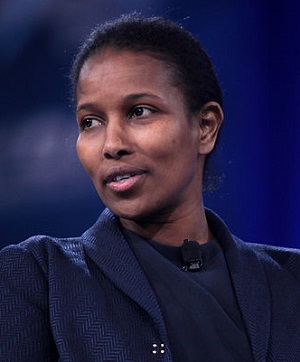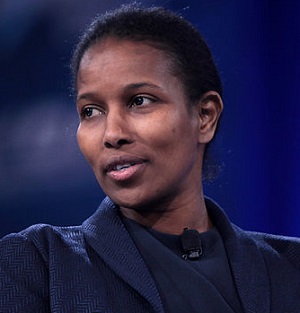Ayyan Hirsi Ali abandoned atheism for Christianity
Many make the same mistake of thinking that by rejecting religion, they automatically enter the field of a better morality. However, atheism does not offer any moral code, nor is it nihilism. It is the gate behind which the search begins. Many, stepping through this gate, have chosen communism, which is a pseudo-humanism that promises universal brotherhood on the piles of corpses of class enemies; others have been enchanted by paganism or New Age, and still others have chosen true humanism, which does not shy away from any heritage and at the same time avoids being enslaved by any heritage.
I am an atheist, but among my role models are extraordinary Christians, Muslims, Buddhists, people who have purged their religious heritage of what is repugnant. Rebellion against religion alone is not a sufficient justification for atheism. There are great humanists who are believers. An ethics independent of religion is not easy, it has no institutions, no priests, no official catechism. Religious humanists don't fare much better. They are heretics, usually rebelling against their religion and their priests.
Ayyan Hirsi Ali is right, of course, that we are dealing with a religious war. Militant Islam fights for Islam's dominance over the infidels. Christianity is decadent, because the Christian heretics were victorious. It was the moderate believers who enforced the separation of religion and state, religious tolerance, freedom of speech and association.
Ayyan Hirsi Ali must have noticed that all too often the destroyers of the constitutional order today are atheists.
Atheism does not provide meaning to life. Of course, that’s not its job. However, there is a more serious problem here: the age of reason is a utopia. Christian heretics sought a system that promoted rationality, a system guarded by a constitutional order. Looking at America from distant Poland, I have the impression that today these values are more often defended by former Muslims, newcomers from the USSR, refugees from Africa, than by native atheists, among whom so many are bewitched by tyrants.
When we look at the ranks of those who destroy the education system, the media, the entire constitutional order, we have an overwhelming impression that atheists are the driving force here. Can we oppose Islam with purely secular tools? asks Ayyan Hirsi Ali. Contrasting democracy with tyranny, we are faced with the question: why do empty promises so often captivate the masses? The romanticism of revolution, demolition, and a community of hot hatred has been supported by social media, and it may seem that the only salvation is a return to religion. I'm not sure about that. What I do know is that as a Christian, Ayyan Hirsi Ali will be a heretic. Is it possible to win the hearts and minds of the masses by rejecting primitive slogans, rallying chants, and false offers?
The proposal to seek the meaning of life in simple honesty is hardly romantic. It does not require belief in supernatural beings, nor does it require dislike of believers. It allows you to defend the civilization that Ayyan Hirsi Ali cherishes the most, but her choice of Christianity does not guarantee victory. Nothing guarantees this victory, although striving for it may constitute the meaning of life.
Today, open atheism in Iran is heroism. I grew up in a country where open atheism was a bit embarrassing because it was associated with the official, thuggish, atheism of the communist authorities. Atheism in the West is increasingly associated with people who, behind the gate that opens the way to an ethics independent of religion, have chosen the gibberish of the woke vanguard of the intellectual proletariat.

